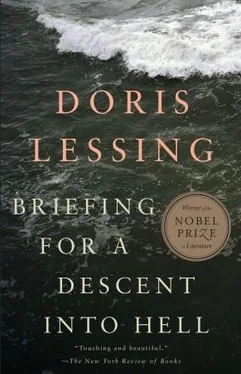And if you do not know what it is I am talking about — then we must accept as true that the unbelievable suggestion that not only bird, lightning, music, rain, the words of a nursery rhyme
How many miles to Babylon?
Four score miles and ten.
Can we get there by candlelight?
Yes, and back again!
but a man talking in a rather ugly lecture room can be charged with this quality and not be aware of it. As a bird can sing all summer and never know that the sounds it makes will remain for a lifetime in the ears of a child in stained streets as the crystallisation of a promise of a recurring spring.
If you do not know what I am saying, do not recognise anything, then …
It was early this year, at the beginning of spring. I was spending the weekend with friends near Cambridge, ex-pupils of mine. They have small children. They were very excited, because full of plans for a new kind of school — no, not to supplant ordinary education, what the State provides, but to supplement it. Some kind of a weekend school with emphasis on unorthodox individual teaching. As I write I am conscious of a feeling of staleness and boredom — yet now as then I am attracted to such ideas. It is that I have been attracted by them so often!
You were to address a couple of dozen parents, because you had been involved for some time in similar schemes. The idea of sitting through an evening in a lecture room nearly kept me at home, yet I believe that such individual efforts to educate, enliven, and provoke are vital — that any country goes as sleepy as a pear, without such efforts. More, that any democracy depends on them. I went, and found myself as I expected, in a rectangular space, coated over with plaster painted grey that was still damp — it was a new hall. It was inadequately heated. There was a wooden platform at one end on which stood the speaker — you. Rows of individuals sat to attention in front of you. The chairs were hard uprights. This is the uninspiring setting that we allow ourselves for the working-out and discussion of the dreams we dream for a better world! The village hall. The local hall. The church hall. We take it for granted of course. A man or woman stands on a low platform with a table by him that has a glass of water on it and perhaps a microphone and in front of him a collection of people who sit facing him, looking up to listen to what he, or she is saying. Out of this process come better schools, hospitals, a new society. We may take it for granted but what could it look like from outside? Very odd, I am sure. Anyway, you were the one that night, a middle-aged man, used to standing on platforms, accomplished and easy in manner, so as not to upset or offend your audience. This is not a criticism, though perhaps it sounds like it. I remember sitting there as you began speaking and thinking you had a perfect platform manner the way doctors have bedside manners.
I was restless and irritable — extraordinarily and unreasonably so, about the whole thing. And I was angry with myself for being like this. I liked what was being said. I liked the fact that all these young parents were proposing to put themselves out in time and expense to educate their children in ways the ordinary school system could not or would not do. I approved of you, the speaker, insofar as it was possible to see what you were like, behind the professionalism of your delivery. Yet I was seething with rebelliousness, with emotion — why should one always have to sit on hard chairs in a characterless hall to hear ideas discussed, why, when one wants to be a citizen and act with others, does it always have to be like this — and why should there always be this phenomenon, people weary and angry with what is provided by society, why did we take that for granted — that it was so always , always had been so, must be so. Why is what happens, what is provided, always so dull and flat and negligible compared with what any ordinary person in the street can imagine as possible and desirable — let alone these young professional parents, all rather highly educated, in the hall. Twenty years ago I had been part of such a group of young parents, on behalf of my own children. Recently again, on behalf of friends’ children. But what we had dreamed of, and then discussed, and then planned, and then tried to put into action, had not taken the shape we had originally dreamed of. Not anywhere near it … There had been results, but nothing that even approached what we knew was possible. Why? What went wrong? What always went wrong? I was sitting very still between my host and hostess, sizzling with exasperation and rebellion and impatience, emotions all quite unsuitable for a retired head-mistress, when you said what struck me so deeply. I remember exactly what you said, because I was in a state of concentrated attention on what you are saying, in spite of my physical restlessness.
“Everybody in this room believes, without knowing it, or perhaps without having formulated it, or at least behaves as if he believes — that children up to the age of seven or eight are of a different species from ourselves. We see children as creatures about to be trapped and corrupted by what trapped and corrupted ourselves. We speak of them, treat them, as if it were possible to make happen events which are almost unimaginable. We speak of them as beings who could grow up into a race altogether superior to ourselves. And this feeling is in everyone. It is why the field of education is always so bitter and embattled, and why no one ever, in any country, is satisfied with what is offered to children — except in dictatorships where the future of children is scaled to the needs of the State. Yet we have become used to this and don’t realise how extraordinary it is, and what the fact of it is saying. For it should be enough to teach the young of a species to survive, to approximate the skills of its elders, to acquire current technical skills. Yet every generation seems to give out a bellow of anguish at some point, as if it had been betrayed, sold out, sold short. Every generation dreams of something better for its young, every generation greets the emergence of its young into adulthood with a profound and secret disappointment, even if these children are in every way paragons from society’s point of view. This is due to the strong but unacknowledged belief that something better than oneself is possible. It is as if the young creatures of humanity grow towards adulthood in a kind of obstacle race, beset by hazards, with the adults trying futilely but gallantly to provide something better. Once adulthood is reached the newly grown ones join with the older ones, their parents, as they turn about and look back into their own infancy. They watch the infancy of their own children with the same futile anguish. Can we prevent these children from being trapped, and spoiled as we have been , what can we do …? Who has not at least once looked into a young child’s eyes and seen the criticism there, a hostility, the sullen knowledgeable look of a prisoner? This happens very young, before the young child is forced to become like the parents, before its own individuality is covered over by what the parents say he is. Their ‘this is right, that is wrong, see things my way.’ This meeting tonight, of young parents joining together to try and provide something better, a better ‘education,’ was nothing more nor less than this phenomenon that repeats itself in every generation. Every person sitting there on hard chairs in front of you felt as if his or her potential had been left unfulfilled. Something had gone wrong. Some painful and wrong process had been completed and had left them, and even after an expensive schooling — most of those present were middle-class people — defective, unfulfilled, if not warped. And so we were doing only what every generation had done; we were looking at our children, as if they had in them to be — that is, if we could think of the right ‘education’ to give them — beings quite different from ourselves. They could be better, braver, gayer. Oh, and more, much more — we thought of them almost as if they were the young of another species, a free, fearless species, full of potentiality, full of that quality which everyone recognises, yet is never defined, the quality which all adults lose, and know that they lose.”
Читать дальше
Конец ознакомительного отрывка
Купить книгу










